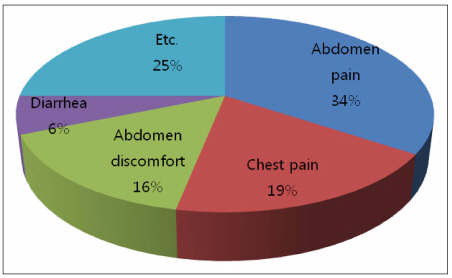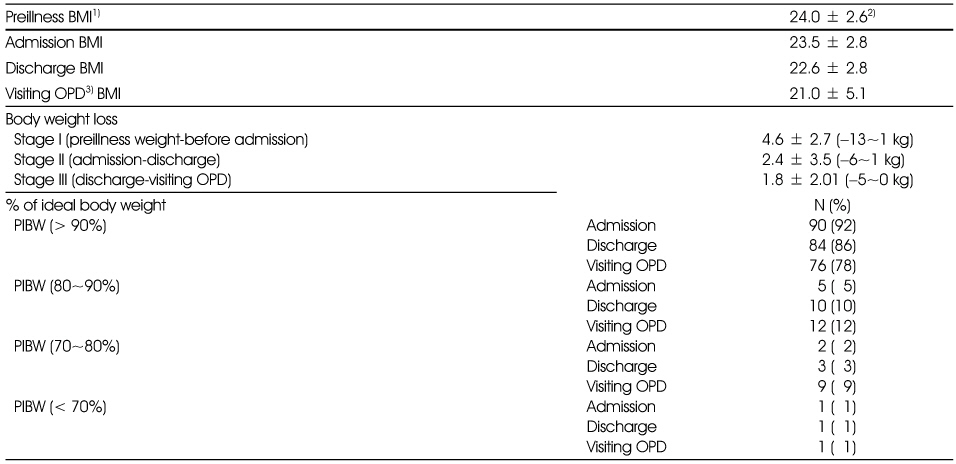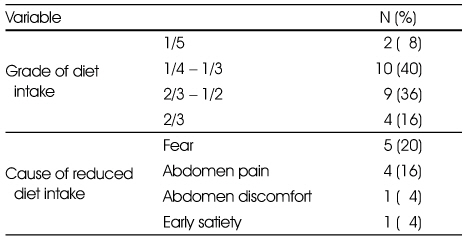Articles
- Page Path
- HOME > Korean J Community Nutr > Volume 17(1); 2012 > Article
-
Original Article
- Nutritional Status and Dietary Change after Gastrectomy of Gastric Cancer Patients
- Young Ok Park, So Yoon Yoon, Shin Sook Kang, Sang Mi Han, Eun Hee Kang
-
Korean Journal of Community Nutrition 2012;17(1):101-108.
DOI: https://doi.org/10.5720/kjcn.2012.17.1.101
Published online: February 29, 2012
ASAN Medical Center Dietetics and Nutrition Services Team, Seoul, Korea.
- Corresponding author: Eun Hee Kang, ASAN Medical Center Dietetics and Nutrition Services Team 388-1 Pungnap-2 dong, Songpa-gu, Seoul 138-736, Korea. Tel: (02) 3010-5141, Fax: (02) 3010-6973, ehkang@amc.seoul.kr
Copyright © 2012 The Korean Society of Community Nutrition
- 458 Views
- 1 Download
- 8 Crossref
Abstract
- The purpose of this survey is to investigate the nutritional status and dietary intake of gastrectomized cancer patients in Asan Medical Center. The subjects were 98 patients, who underwent a gastrectomy due to gastric cancer and were admitted to the General Surgery Department during March 2007 to December 2007. We examined general characteristics (sex, age, clinicopathological stage, type of operation), anthropometric data (height, weight change), biochemical data (red blood cell RBC, hemoglobin HGB, hematocrit HCT, mean corpuscular volume MCV, total lymphocyte count TLC, albumin, total cholesterol), dietary intake and dietary intake related symptoms. Weight loss of gastrectomized patients was 9.0 ± 4.3% from preillness weight to visiting out-patient department (OPD) weight. Biochemical data (RBC, HGB, HCT, MCV, TLC, albumin, total cholesterol) significantly deteriorated after gastrectomy. However, outpatient visits were all restored to the normal range. Postoperative energy intake was 785.0 ± 164.2 kcal, which corresponds to 41.6 ± 9.6% of daily energy requirement. The cause of poor oral intake is mostly fear, abdominal pain and abdominal discomfort. Therefore, to control pre-or post-operative weight change in the future requires, focusing on the body weight to maintain a normal or usual nutrition by interventions and increased caloric intake during hospitalization for the development of nutrient-dense meals. In addition, as the main reason of the lack of intake of meals after the gastrectomy was fear, the patients should be actively encouraged to consider the importance of eating proper meals.
- 1. Adams JF. The clinical and metabolic consequences of total gastrectomy(III): notes on metabolic functions, deficiency states, changes in intestinal histology, and radiology. Scand J Gastroenterol. 1968; 3(2): 152-159.PubMed
- 2. Bae JM, Park JW, Yang HK, Kim JP. Nutritional status of gastric cancer patients after total gastrectomy. World J Surg. 1998; 22(3): 254-260.ArticlePubMedPDF
- 3. Bozzetti F, Ravera E, Cozzaglio L, Dossena G, Agradi E, Bonfanti G, Koukouras D, Gennari L. Comparison of nutritional status after total or subtotal gastrecotmy. Nutrition. 1990; 6(5): 371-375.PubMed
- 4. Bradley EL, Isaacs J, Hersh T, Davidson ED, Millikan . Nutritional consequences of total gastrectomy. Ann Surg. 1975; 182(4): 415-429.ArticlePubMedPMC
- 5. Braga M, Molinari M, Zuliani W, Foppa L, Radaelli G, Cristallo M, Di Carlo V. Surgical treatment of gastric adenocarcinoma- impact on survival and quality of life. Hepatogastroenterology. 1996; 43(7): 187-193.PubMed
- 6. Braga M, Zuliani W, Foppa L, Di Carlo V, Cristallo M. Food intake and nutritional status after TG-results of a nutritional follow up. Br J Surg. 1988; 75(5): 477-480.PubMed
- 7. Bragelmann R, Armbrecht U, Rosemeyer D, Schneider B, Zilly W, Stockbrugger RW. Nutrient malassimilation following total gastrectomy. Scand J Gastroenterol Suppl. 1996; 218: 26-33.PubMed
- 8. Choi JJ. Gastric cancer screening and diagnosis. Korean J Gastroenterol. 2009; 54: 67-76.ArticlePubMed
- 9. Cristallo M, Braga M, Agape D, Primignani M, Zuliani W, Vecchi M, Murne M, Sironi M, Di Carlo V, De Franchis R. Nutritional status, function of the small intestine and jejuna morphology after total gastrctomy for carcinoma of the stomach. Surg Gynecol Obstet. 1986; 163(3): 225-230.PubMed
- 10. Grant JP, Custer PB, Thurlow J. Current technique of nutritional assessment. Surg Clin North Am. 1981; 61(3): 437-461.PubMed
- 11. Harju E. Metabolic problems after gastric surgery. Int Surg. 1990; 75(1): 27-35.PubMed
- 12. Jeong MJ, Kim CY, Kim SB. A study on nutritional status after gastrectomy of gastric cancer patients in Jeonbuk province. Korean J Community Nutr. 2006; 11(6): 785-792.
- 13. Kelly WD, MaClean LD, Perry JF, Wangensteen OH. A study of patient following total and near total gastrectomy. Surgery. 1954; 35(6): 964-982.PubMed
- 14. Kim TH, Kim WG, Cho YY, Lee YH, Kim JP. A study of nutritional assessment and dietary intake after gastrectomy of gastric cancer patients. Korean J Nutr. 1994; 27(8): 844-855.
- 15. Kinney JM, Long CL, Duke JH. Tissue composition of weight loss in surgical patients. I. Elective operation. Ann Surg. 1968; 168(3): 459-474.ArticlePubMedPMC
- 16. Ministry for Health, Welfare and Family Affairs. Annual report of the Korea Central Center Registry. 2008.
- 17. Lee CH, Lee SI, Ryu KW, Mok YJ. Chronological changes in the clinical features of gastric cancer. J Korean Surg Soc. 2002; 63(4): 298-304.ArticlePDF
- 18. Nam SY, Choi IJ, Park KW, Kim CG, Lee JY, Kook MC, Lee JS, Park SR, Lee JH, Ryu KW, Kim YW. Effect of repeated endoscopic screening on the incidence and treatment of gastric cancer in health screenees. Eur J Gastroenterol Hepatol. 2009; 21(8): 855-860.ArticlePubMed
- 19. Stael vom Holstein C, Ibrahimbegovic E, Walther B, Akesson B. Nutrient intake and biochemical markers of nutritional status during long-term follow-up after total and partial gastrectomy. Eur J Clin Nutr. 1992; 46(4): 265-272.PubMed
- 20. Studley HP. Percentage of weight loss-A basic indicator of surgical risk in patients with chronic peptic ulcer. JAMA. 1936; 16(4): 458.
- 21. Young GA, Hill GL. Assessment of protein-calorie malnutrition in surgical patients from plasma proteins and anthropometric measurement. Am J Clin Nutr. 1978; 31(3): 429-435.PubMed
- 22. Yu WS, Chung HY. Nutritional status after curative surgery in patients with gastric cancer: comparison of total versus subtotal gastrectomy. J Korean Surg Soc. 2001; 60(3): 297-301.
- 23. Zelnick R, Auguste LJ, Wise L. Nutritional effects of postgastrectomy reconstruction: a clinical evaluation. J Surg Oncol. 1989; 40(4): 219-221.ArticlePubMed
REFERENCES
Figure & Data
REFERENCES
Citations

- Comparison of blood biochemical characteristics and dietary intake by sex in gastric cancer patients over 40 years in Korea based on 7th (2016-2018) Korea National Health and Nutrition Examination Survey: a cross-sectional study
Hyeon-Ju Lee, Sung-Won Oh, Sook-Bae Kim
Korean Journal of Community Nutrition.2023; 28(1): 48. CrossRef - Oral Nutritional Supplements Reduce Body Weight Loss after Gastrectomy in Patients with Gastric Cancer: A Systematic Review and Meta-Analysis of Randomized Controlled Trials
Mijoo Choi, Jong-Yeup Kim, Hyun-Hi Kang, Eunju Park, Sung Ryul Shim
Nutrients.2023; 15(18): 3924. CrossRef - [Republished study] Assessing Nutritional Status in Outpatients after Gastric Cancer Surgery: A Comparative Study of Five Nutritional Screening Tools
Jae Won Cho, Jiyoung Youn, Min-Gew Choi, Mi Young Rha, Jung Eun Lee
Korean Journal of Community Nutrition.2022; 27(3): 205. CrossRef - Assessing Nutritional Status in Outpatients after Gastric Cancer Surgery: A Comparative Study of Five Nutritional Screening Tools
Jae Won Cho, Jiyoung Youn, Min-Gew Choi, Mi Young Rha, Jung Eun Lee
Korean Journal of Community Nutrition.2021; 26(4): 280. CrossRef - A Case Study on the Customized Nutrition Intervention for a Patient with Primary Gastrointestinal Non-Hodgkin Lymphoma Underlying Chronic Kidney Disease
Young-Hwa Song, Han-Na Kwon, Jeong-Im Hong, Juyeon Park, Ji-Yeon Kim, Hye-Jin Kim
Clinical Nutrition Research.2020; 9(4): 332. CrossRef - Change in Dietary Intake and Nutritional Status Using Mealworms as Hospital Meal in Postoperative Patie
Seong Hyeon Kim, Jin Young Shon, Jun Sung Park, Jong Won Kim, Jung Hyun Kang, Eun Young Yun, Jae Sam Hwang, Hyung Mi Kim
Journal of the Korean Dietetic Association.2016; 22(4): 292. CrossRef - Development of a Self-Care Performance Scale for Patients with Stomach Cancer after Gastrectomy
Min Kyung Jeon, Geum Ja Park
Asian Oncology Nursing.2016; 16(2): 67. CrossRef - Postoperative Changes in Body Weight, Anxiety, Depression, and Quality of Life after Radical Gastrectomy among Patients with Gastric Cancer
Jin Ha Kim, Ja Yun Choi
Asian Oncology Nursing.2014; 14(3): 139. CrossRef


Fig. 1
Fig. 2
General characteristics
Changes of BMI, body weight loss, percentage of IBW(ideal body weight) in each period
1) BMI: body mass index (kg/m2)
2) Mean ± SD
3) OPD: out-patient department
Biochemical data in each period
1) Mean ± SD
2) OPD: outpatient department
3) RBC: Red blood cell
4) HGB: Hemoglobin
5) HCT: Hematocrit
6) MCV: Mean corpuscular volume
7) TLC: Total lymphocyte count
Energy intake in each period (N=98)
1) Mean ± SD
2) NPO: nothing by mouse
Cause of reduced diet intake upon pre-operation
Cause of reduced diet intake upon post-operation
1) BMI: body mass index (kg/m2) 2) Mean ± SD 3) OPD: out-patient department
1) Mean ± SD 2) OPD: outpatient department 3) RBC: Red blood cell 4) HGB: Hemoglobin 5) HCT: Hematocrit 6) MCV: Mean corpuscular volume 7) TLC: Total lymphocyte count
1) Mean ± SD 2) NPO: nothing by mouse

 KSCN
KSCN








 PubReader
PubReader Cite
Cite


